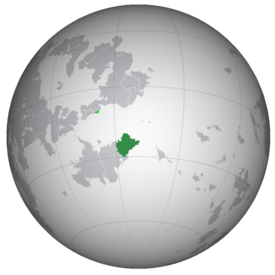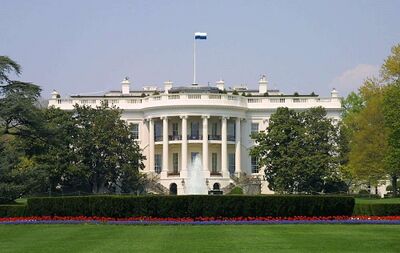Hylia
This article is incomplete because it is pending further input from participants, or it is a work-in-progress by one author. Please comment on this article's talk page to share your input, comments and questions. Note: To contribute to this article, you may need to seek help from the author(s) of this page. |
United State of the Hylian Republic Her Stata Unida der her Respublica Hyliana | |
|---|---|
| Motto: "Libertat Egalite Unita" ("Liberty, Egality, Unity") | |
| Anthem: Her Hylianei ("The Hylian") | |
 | |
| Capital | Santiago de Hylia |
| Other languages | |
| Ethnic groups |
|
| Religion | Secular State
|
| Demonym(s) | Hylian, Hylian |
| Government | Federal Semi-Presidential republic |
• President of the Hylian Republic | Lord Kirik Neil |
• Prime Minister of the Hylian Republic | Lord Karl Pierre |
| Legislature | The Hylian Parliament |
| The Federal Council | |
| The Federal Senate | |
| Independent state | |
• Foundation of Hylia | july 16th 1867 |
• Proclamation of the Republic | June 7th 1900 |
| april 1th 1941 | |
• Badanko Era | 1941-1970 |
• Re-establishment of The Republic | 1970 |
| Area | |
• Total | 666,520 km2 (257,340 sq mi) |
| Population | |
• January 2022 estimate | 79,982,400 |
• Density | 120/km2 (310.8/sq mi) |
| GDP (PPP) | 2020 estimate |
• Total | 2,359,480,800,000 |
• Per capita | 29,500 |
| HDI (2021) | very high |
| Currency | Hylian Dollar (HDC) |
| Time zone | +9,+10,+11 |
| Driving side | right |
| Calling code | +250 |
| Internet TLD | .hy |
Her Stata Unida der her Respublica Hyliana or commonly called Hylia is an sovereign state of Anteria whose continental territory is located on the eastern part of the large southern island of Meredonne and whose overseas territory (costa venta and the Pelvas Islands) are located in its immediate vicinity.
The Hylian Republic borders with the Federation of Hainekirk on its mainland, with the The New Bulgarian Order in Costa Venta as well as a maritime border with Bayside.
Hylia is a semi-presidential federal republic. the motto of the republic is since 1901 "Heri Respublica Y Viver" (in republic we live) and its flag consists of white, ocean blue and sky blue, its National Anthem is "Her Terra Ders Pevales" (the land of the peoples). its capital is Santiago de Hylia (abbreviated as Santiago) and its official language is Hylian since 1885, replacing Morrawian.
the official currency of Hylia is the Hylian Dollars throughout its territory.
Hylia enters history late with the colonial expedition of Francis Shoren of 1867 which colonizes the region and makes it a land of migration, the country then separates from Morrawian tutelage in 1868 after the proclamation of the kingdom of Hylia by this last, at his death the republic will be established.
In 1941, in the midst of a recession, the country was the victim of a coup d'état led by the military who would lead the country for 29 years before the return of democracy.
Hylia exerts most of its power over the Hylian Sea.
Hylia has an army of 155,000 men divided into the Forza Terra, the Forza Aera and the Forza Marina that operates in the waters bordering Hylia.
History
First human presence
the first human presence on the current hylia dates back 5,000 years, it is possible that according to the sea currents and the birds, men probably ancestors of the Namarians colonized the region. From the year 1500, the Namarians organized themselves into 5 large tribal kingdoms, Agbo, H'lidi, P'omka Hololi and Ser'Nard (only the tribal kingdom of Agbo in the current Namaria still exists as a symbol ).
Morravian Expedition
The current Hylia was discovered on January 4, 1604 by the Morrawian explorer Harald Orden in the service of the house of Awstrowitz who then reigned over the current Morrawia, the kingdom then established several outposts scattered along the north coast including Fort -Lamid current santiago founded on January 16, 1804.
colonization
in 1712, the Morrawians discovered gold nuggets in the Martha River the news causes a large wave of immigration in all thrismaria towards Hylia, the towns of Grandville, Marvick and Hemata are founded by this wave.
in 1859, the wave of immigration has definitely tipped the population balance between Settlers and Namarians.
Geography
Hylia is situated on the southern hemisphere, encompasses an area of 666,520 square kilometers and is home to a population of 79 million inhabitants, resulting in an average population density of 120 individuals per square kilometer. Hylia's geography is marked by a distinct distribution of climates, with approximately 80% of its territory enjoying a temperate climate, while the northern region of Nordicosta features a tropical climate, covering around 20% of its landmass. One prominent geographical feature of Hylia is the imposing mountain range known as the Judor Mountains, which traverses the country from the north to the southeast, contributing to the diversity of its landscape and remarkable topography. its highest point is the Mont-Grand which rises to 3,542 meters above sea level.
the Pelvas Islands are of volcanic origin with some volcanoes still active, the mountainous nature of the center of these islands means that 90% of the local population lives on the coast.
Climate
Hylia has on the vast majority of its territory a tropical climate and temperatures exceeding 30 degrees in summer and temperatures up to 20 degrees in winter.
Environment
Politics and Government
Hylia is a Federal Semi-Presidential Republic, whose divided into 9 states, a federal district and a territory. Unofficially, his political system looks more like Unitarianism.
Executive power is ensured by the Lord-President of the republic who appoints a prime minister who will form his government.
Legislative power is ensured by the Federal Senate (the lower house) and the Federal Council (the upper house).
the Hylian constitution (officially "the constitution of the 2nd Hylian republic") dates from 1970 and is based on the first constitution of 1900.
the president of the republic is since December 12, 2021 his honorable Lord Kirik Neil who has as head of government and prime minister Lord Karl Pierre since June 10, 2022.
Defense
Since 1970, the defense of Hylia and its interests is provided by the Hylian Defense Forces succeeding the National Hylian Army, it is composed of 110,000 professional soldiers and 42,000 retained conscripts.
the Hylian soldiers are very well trained but have to face problems of aging of the material, its little diversified material and a reduction in the workforce caused by the repeal of military conscription.
Foreign Relations
Economy
Hylie have a diversified economy and produce cars, weapons, tanks, ships, planes, minerals, little hydrocarbon and agricultural products such as rice, corn, grapes and wine in some microclimate or Wheat at the foot of the Judor Mountains.
Energy
Industry
Infrastructure
Transport
Demographics
The demography of the Country is characterized by a population of 79 million inhabitants, with an annual population growth rate of 0.3%. The ethnic composition of Hylia's population reflects a diverse makeup, with 64% identified as Hylians, 16% as Namarians, 14% as French, 4% as Morrawians, and the remaining 2% representing various other ethnic groups.
Education
The education system is directed at the national level by the Ministry of National Education. Since the Education Act of 1989 (Loi Martin-Perva der 1989), education is compulsory in Hylia from 3 to 16 years old, and compulsory training from 16 to 18 years old.
This system is divided into three major successive stages: primary education (Maternelle and École Primare), followed by secondary education (collège, lycée and certain specific school), then, possibly, higher education (universita, large schools, specific training, etc.).
Religion
Hylia is asecular state, religious affiliation presents a multifaceted landscape, with 49% of the population identifying as Catholics, 35% as agnostics, 13% as practitioners of Namarian animism, and the remaining 3% adhering to various other religious beliefs and traditions.
The Hylian Catholic Church is organized around the Archbishop of Santiago, Monsignor Laurent Moncalei, Primate of Hylia.
Culture
the Hylian culture was born from a mix of Morrawian, French, Namarian and other minority culture brought with the settlers during the great expedition.
In 2009 a Hylian website Roundmap.hr gave birth to countryballs, spherical characters personifying the countries of Anteria depicted in comic strips. in 2023 the Senate proposes to register countryballs on the list of Hylian Cultural Heritage.
Music and Art
Cuisine
Sports
Rugby rivals Football as a national sport, although the World Cup brings together the whole country, most of the time Hylians will watch Rugby more than Football. Excluding these two sports, the Tour of Hylia, which is the third most watched event per year, consists of crossing the country by bike and the final stage of which takes place in Santiago.



